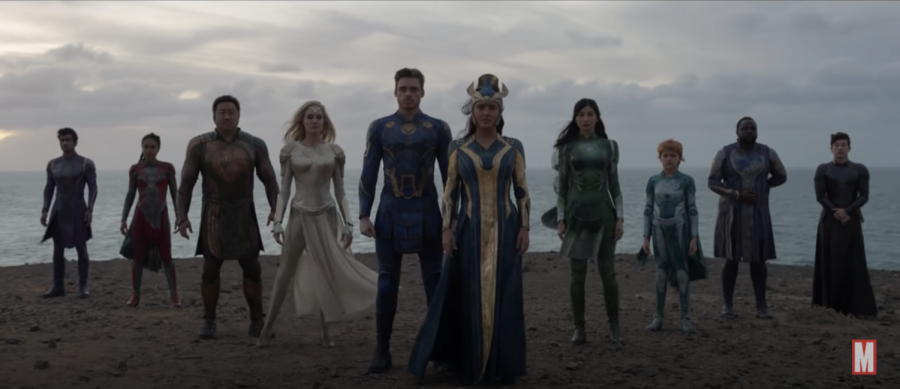‘Eternals’ is stunning but shallow, leaving the MCU in peril
The Eternals, led by their leader Ajak, arrive on Earth thousands of years ago. While “Eternals” is fun to watch, it is at times confusing and inconsistent, leaving the future of the franchise at stake.
Facing some of Marvel’s worst critical responses yet, but also setting a unique precedent for the MCU, “Eternals” hits and misses are striking.
The Eternals are a band of immortal alien creatures who have secretly lived among humans for centuries, protecting them from Deviants, murderous creatures who wreak havoc upon the Earth. While the Eternals believe they’ve eliminated them, the Deviants reemerge stronger than ever, forcing the team to band together once again.
“Eternals” faces a huge plot hole that it attempts — but ultimately fails — to address. Five or so years before the events of the movie, villain Thanos wipes out half of the universe with a snap, dominating the events of “Avengers: Infinity War” and “Avengers: Endgame.” This has proved difficult for Marvel to move on from already, with “Loki” being the only post-”Endgame” movie or series not to fixate on the ramifications of “Endgame”.
“Eternals” fails to demonstrate why they didn’t attempt to stop Thanos. While they pass it off, saying they only use their power to stop Deviants, they also state multiple times they are responsible for protecting Earth, so viewers are still left wondering why they didn’t step in.
This adds to the question of where the MCU can go from here. With Loki’s introduction of the multiverse and now “Eternals”’s introduction of complex beings Eternals, Marvel is starting to feel like a far more complicated franchise than the one that had to deal with out-of-control artificial intelligence (in “Age of Ultron”), or even the one that had to handle the threat to wipe out half of the universe (in “Infinity War”).
Why should a viewer care about a small town villain or out-of-control AI when the world could end at any point?
Ultimately, to retain such a large viewership, Marvel needs to stay within its original scope, and the introduction of parallel universes and beings greater than Earth itself complicates the relationships certain viewers have with the MCU. Complexities like timeline alteration and the influence never-seen-before characters have had for centuries on Earth will simply continue to add plot holes and unanswered questions to the MCU, something Marvel has been relatively good at avoiding until now.
The diversity of the cast is one of the more laudable aspects of “Eternals,” with Marvel’s first deaf character and first explicitly gay relationship. But it does leave you wondering whether Marvel chose to do this intentionally in a more experimental film anyways — one that deviates from its typical plot structure, doesn’t include any familiar characters and enters new territory with Marvel’s first, albeit brief, sex scene.
It raises the question as to whether including this type of diversity would be exclusive to this movie and then simply abandoned, a way of dipping their toes in it to sense audience reactions before including it in a box office dominator. It wasn’t a complete flop, but it did have the weakest opening weekend since “Ant-Man,” only grossing about $70 million. This level of diversity likely won’t carry over into blockbusters like “Spider-Man: No Way Home” and “Doctor Strange in the Multiverse of Madness,” both of which will be released in the next few months.
While “Eternals” itself was an exciting watch, the Marvel fan inside me wonders if the franchise is in danger. Intertwined conflicts that have always held the MCU together would be impossible to balance all in the same movie, and while I hope to be proven wrong, it may start to feel like the movies aren’t even happening in the same universe.




